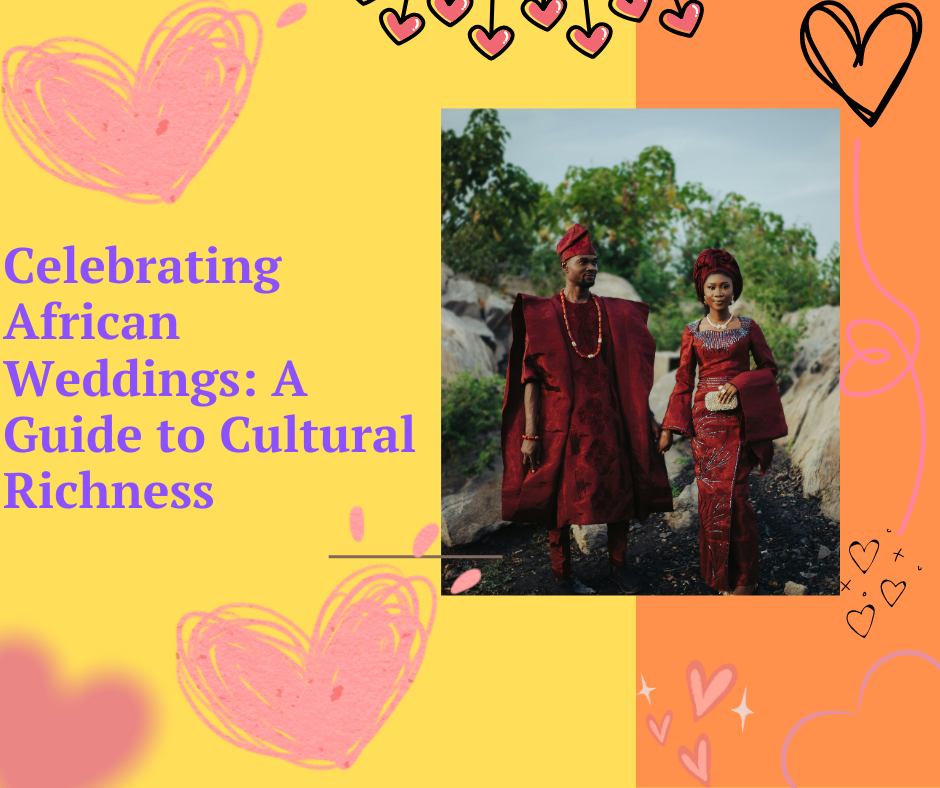1. The Importance of Family and Community
Unlike Western weddings, which often focus on the couple, African weddings are a union of two families and sometimes even entire communities. Family elders play a significant role in planning and decision-making.
Key Elements:
Elders give blessings and approvals before the marriage is formalized.
Extended family and friends participate in wedding preparations.
Community members contribute to the ceremony through gifts, songs, and dances.
2. Traditional Wedding Ceremonies Across Africa
Africa is a vast continent with diverse wedding traditions. Here are a few examples:
Nigerian Weddings: Yoruba weddings feature the groom's prostration before the bride’s family, while Igbo weddings include the "wine-carrying" ceremony, where the bride presents palm wine to her chosen husband.
Ghanaian Weddings: Known as “Engagement,” Ghanaian traditional weddings involve formal negotiations between families and gift exchanges.
South African Weddings: The Zulu wedding (Umabo) includes the bride’s arrival at the groom’s home, where she presents gifts to her in-laws.
Ethiopian Weddings: The groom and his family must formally request the bride’s hand in marriage, often engaging in humorous negotiations.
Somali Weddings: Somali weddings include the Nikah (Islamic marriage contract) and a series of festive events filled with poetry, dance, and music.
3. The Role of Lobola and Bride Price
In many African cultures, a groom must pay Lobola (bride price) as a sign of appreciation to the bride’s family. Traditionally, this was paid in cattle, but today, it can be money or gifts.
Modern Adaptations:
Some families request symbolic Lobola rather than large sums of money.
Many couples negotiate flexible terms to balance tradition with financial realities.
Some modern African weddings skip Lobola entirely in favor of mutual agreement.
4. African Wedding Attire: A Celebration of Culture
African weddings are known for their stunning traditional attire, which varies by culture:
West African Weddings: Brides wear Aso Oke (Nigeria) or Kente (Ghana), while grooms dress in Agbada or Kente cloth.
East African Weddings: Brides wear Dirac (Somalia) or Gomesi (Uganda), while men wear Kanzus.
Southern African Weddings: Xhosa and Zulu brides wear beaded headpieces and colorful skirts, while men wear traditional animal-skin garments.
5. Music and Dance: The Heart of African Weddings
Music and dance are central to African weddings, symbolizing joy and unity. Drumming, singing, and traditional dances bring life to the celebration.
Popular Wedding Dances:
Gwara Gwara (South Africa)
Azonto (Ghana)
Shaku Shaku (Nigeria)
Sega (Mauritius and Seychelles)
6. Traditional Foods at African Weddings
Food plays a huge role in African weddings, showcasing the richness of African cuisine. Guests are treated to a feast, with meals varying by region:
Jollof rice and Suya (West Africa)
Injera with Doro Wat (Ethiopia)
Sadza and Nyama Choma (Southern Africa)
Pilau and Mandazi (East Africa)
Many weddings also feature a symbolic sharing of food between the couple, representing unity and prosperity.
7. Blending Traditional and Modern Weddings
Many African couples today combine traditional and Western wedding elements. They may have:
A traditional wedding ceremony to honor cultural customs.
A civil or religious wedding to fulfill legal or religious requirements.
A modern reception with contemporary décor, DJs, and social media trends.
8. Wedding Gifts and African Traditions
In African weddings, gifts are often given in the form of money, livestock, or household items to help the couple start their new life. Some couples opt for gift registries, but many still embrace the tradition of receiving contributions from family and friends.
Final Thoughts
African weddings are more than just ceremonies—they are celebrations of love, heritage, and community. Whether you choose a fully traditional wedding or a fusion of modern and cultural elements, the richness of African wedding traditions ensures that your special day is meaningful and unforgettable.
